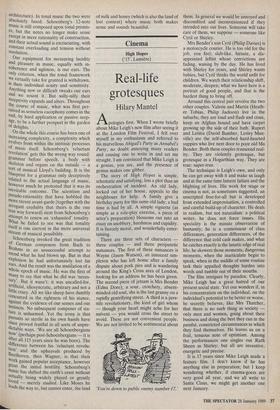Cinema
High Hopes ('15', Lumiere)
Real-life grotesques
Hilary Mantel
Apologies first. When I wrote briefly about Mike Leigh's new film after seeing it at the London Film Festival, I fell over myself in my enthusiasm and referred to his marvellous Abigail's Party as Annabel's Party, no doubt annoying many readers and causing one to write in and set me straight. I am convinced that Mike Leigh is a genius, you see, and the presence of genius makes one gibber. The story of High Hopes is simple, schematic and satisfying, less a plot than an orchestration of incident. An old lady, locked out of her house, appeals to the neighbours for help. A family give a birthday party for this same old lady; a bad time is had by all. A simple vignette (as simple as a role-play exercise, a piece of actor's preparation) blossoms out into an essay on snobbery, harshness and cupidity. It is fiercely moral, and wonderfully enter- taining. There are three sets of characters three couples — and three peripatetic nuisances. The first of these nuisances is Wayne (Jason Watson), an innocent sim- pleton who has left home after a family dispute about pork pies and is wandering around the King's Cross area of London, looking for an address he has been given. The second piece of jetsam is Mrs Bender (Edna Dore); a sour, crotchety, absent- minded old soul, she is the last granny on a rapidly gentrifying street. A third is a juve- nile revolutionary, the kind of girl whom — though your heart might ache for her naïveté — you would cross the street to avoid. These are not convenient people. We are not invited to be sentimental about `You're down to public enemy number I7.' them. In general we would be annoyed and discomfited and inconvenienced if they intruded into our lives. Someone will take care of them, we suppose — someone like Cyril or Shirley.
Mrs Bender's son Cyril (Philip Davies) is a motorcycle courier. He is too old for the job, you feel; slab-like, hirsute, a dis- appointed leftist whose convictions are fading, waning by the day. He has lived with Shirley for years, and Shirley wants babies, but Cyril thinks the world unfit for children. We watch their relationship shift, moderate, deepen; what we have here is a portrait of good people, and that is the hardest thing to bring off.
Around this central pair revolve the two other couples. Valerie and Martin (Heath- er Tobias, Philip Jackson) live in the suburbs; they are loud and flash and crass, keep -an Afghan hound and have carpet growing up the side of their bath. Rupert and Letitia (David Bamber, Lesley Man- ville) are the self-absorbed hard-hearted yuppies who live next door to poor old Ma Bender. Both these couples transcend real- ity. They are violently grotesque, but grotesque in a Hogarthian way. They are true: super-true.
The technique is Leigh's own, and only he can get away with it and make us laugh and at the same time lament failure and the blighting of lives. His work for stage or cinema is not, as sometimes suggested, an unscripted free-for-all but is developed from extended improvisation, a controlled and careful build-up of character. He deals in realism, but not naturalism: a political writer, he does not force issues. His speciality is the minute observation of humanity; he is a connoisseur of class differences, generation differences, of the difference that cold cash makes, and what he catches exactly is the lunatic edge of real life; he skewers those moments, dangerous moments, when the inarticulate begin to speak, when in the middle of some routine task their appalled thoughts harden into words and tumble out of their mouths.
The film intrigues by paradox. Clearly, Mike Leigh has a great hatred of our present social state. Yet one wonders if, in his concentration on the individual, on the individual's potential to be better or worse, he secretly believes, like Mrs Thatcher, that there is no such thing as society only men and women, going about their business and doing the best they can in the painful, constricted circumstances in which they find themselves. He leaves us on a frail, tenuous note of optimism. Among the performances one singles out Ruth Sheen as Shirley; but all are inventive, energetic and precise.
It is 17 years since Mike Leigh made a feature film. I don't know if he has anything else in preparation; but I keep wondering whether, if cinema-goers are very good all year, and we all write to Santa Claus, we might get another one next January.

















































 Previous page
Previous page